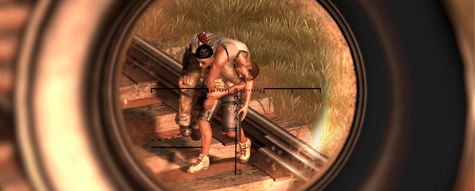-
A really nice look at how to play fighting games, starting with the urtext – Super Turbo – and the ur-character – Ryu – and breaking apart the entire game as a reaction to Ryu's skillset. It's a variation on what I blather about when I blather about the design of fighting games, which I do a lot.
-
"…let's not kid ourselves. If you sell a game that's a first-person shooter, then no matter how many RPG elements you shoe-horn into the game, the shadow that hangs over every character interaction that you have, no matter who they are, is the question in the player's mind of "What happens if I shoot this person?" And that's our own fault! We've sold the player that; we've made a contract with the player that says it's okay to kill people. Why would we then chastise them for exploring that?" Patrick Redding is brilliant. This interview, with Chris Remo on Gamasutra, is great – Remo asks some smart questions, and Redding gives some really smart answers.
-
"The game insists that I focus, even for mundane activities like carrying groceries, on carefully following directions delivered to me visually on-screen. The simple act of carrying groceries is subsumed by the mechanical procedure of executing a series of prompts _for no apparent reason_. This, for me, is the primary disconnect in Heavy Rain. My mechanical game-directed actions don't amplify or add meaning to the in-game behaviors they execute. They don't pull me in; they keep me out. " Hmn. I've been thinking about something similar recently. Time to fire up the blogpostmatron…
-
Lovely, lovely article explaining just how the PeepCode Blog works. The blog itself features unique layouts for every post. There's no CMS, no database, but what's going on under the hood is at least as clever – and the flexibility makes the beautiful and clear pages much easier to build.
-
"…for reasons that baffle me, my TV can only receive the four terrestrial channels, plus a grainy feed from the building’s security cameras. Easy choice."
-
"Obama Says: Yes We Can is a Simon Says game based on Barack Obama's New Hampshire Primary speech, as later turned into song by will.i.am. Watch the game create a pattern of button and direction presses, and repeat that pattern correctly to score! The more you get correct, the harder the patterns become – can you keep up?" Oh blimey.
-
Lots of good stuff in here I didn't know about, all for your DS, and all not illegal. Hurrah for homebrew.
-
"With DS Reader you can read any e-book (or text file) on your DS. It even has a great little bookmarking function to keep track of your progress." Ooh.
-
"Game Trivia Catechism is a multiple-choice trivia game, testing your knowledge of video gaming. It can be played as straight trivia, or as part of a story that follows Al and Sally as they compete in the King of Game Trivia Tournament." Looks awesome.
-
"Current mass-market games present simulations of incredible fidelity. Many of these titles also push genre boundaries and offer new mechanics to players. The problem, argues Ubisoft’s Patrick Redding (FAR CRY 2), is that these two developments are disconnected. Game output appears information-rich, but how much of that information can the player actually use to play better, and how much of it is just there to be spectacular or cinematic?" I would pretty much kill to see this. Gah.
-
For those of you who might not be aware of its size, James has put the size of Gaza in context through comparing it to maps of other cities. Simple, effective communication.
Africa Wins Again: Far Cry 2’s literary approach to narrative
22 December 2008

Far Cry 2 is a difficult game to write about; difficult because it’s an experience that doesn’t coalesce in individual moments or fragments. Whilst there are many memorable moments I can point to – the dynamic, emergent gunfights that characterise the gameplay, the starkness of the major plot beats – it is the player’s overall experience of the game that is its greatest strength.
And isn’t that how things should be? For a game that revels in the open world that it’s set in – a fictitious African country that covers desert and mountain, swamps and savannah – it only seems appropriate that it be a game about the impact of a world on a character, rather than that character’s interactions with the world. Far Cry 2 takes the mechanics of its open-world shooting experience, and works out how to wrap them into a much larger narrative without losing the coherence of the player’s actions.
Far Cry’s references to Conrad (and, in particular, Heart of Darkness) are well-documented already, but I think to focus on the words used, the plot the game follows and the references within the game so explicitly isn’t necessarily useful. What struck me was not the game’s similarity to Conrad; it its much broader, deeper appropriation of literary techniques – whilst using them in an inherently gamelike manner – as a way to tell stories.
(Before we go on: there are likely to be what you might call “spoilers” ahead, so there’s a break in the text for those of you viewing on the web. I don’t see how we can talk meaningfully about this game without talking about specifics, so if you’ve not finished it and really care about this kind of thing, look away now.)
Continue reading this post…